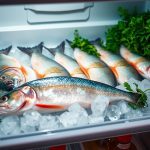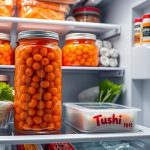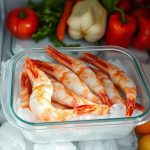Seafood storage can be tricky, especially for clams. These shellfish need special care to stay fresh and safe. Let’s explore how to keep your clams at their best.
Fresh, unshucked clams can last up to 2 days in the fridge. Plan your meals accordingly to enjoy them at peak freshness. Proper refrigeration is crucial for maintaining shellfish quality.
Clams require more attention than other seafood types. They’re alive when purchased, so they need to breathe. Avoid sealing them in plastic bags or submerging them in water.
Use porous bags or covered bowls with damp cloths for storage. This keeps clams moist but not wet, ensuring their survival and freshness.
Key Takeaways
- Unshucked clams last up to 2 days in the fridge
- Store clams at 32–35 °F (0–2 °C)
- Use porous bags or covered bowls for storage
- Avoid sealed plastic bags or submerging in water
- Shucked clams stay fresh for 2-3 days in the fridge
- Frozen clams can last about 3 months
- Don’t refreeze thawed clams
Understanding Fresh Clams and Their Storage Requirements
Fresh clams are tasty seafood treats. Proper storage keeps them at their best. Let’s explore clam types and how to store them correctly.
Types of Clams Available in Markets
Markets offer various fresh clams like littlenecks, butter clams, and cockles. These shellfish are available year-round but taste best in colder months.
Some clams close their shells completely. Others, like softshell clams, can’t do this.
Importance of Proper Clam Storage
Correct storage is crucial for fresh clams. They need to be eaten within 48 hours. This short window helps prevent illness and reduce waste.
Ideal Storage Conditions for Fresh Clams
Store clams in porous bags or covered bowls with damp cloths. Keep them in the fridge. Don’t use sealed plastic containers or submerge them in water.
Clams that close their shells can last up to seven days. Those that can’t should be used within three to four days.
Shucked clams can be refrigerated for up to three days. You can freeze them for up to three months.
| Clam Type | Storage Method | Storage Duration |
|---|---|---|
| Live, shell-closing clams | Refrigerated in breathable container | Up to 7 days |
| Live, unable to close shell | Refrigerated in breathable container | 3-4 days |
| Shucked clams | Refrigerated | Up to 3 days |
| Shucked clams | Frozen | Up to 3 months |
Follow these tips to enjoy fresh, safe clams. Make the most of your seafood experience!
How Long Does Clams Last in the Fridge
Knowing how long clams stay fresh is key for seafood fans. Different clam types last for various times in the fridge. Let’s explore how long different clams can be stored safely.
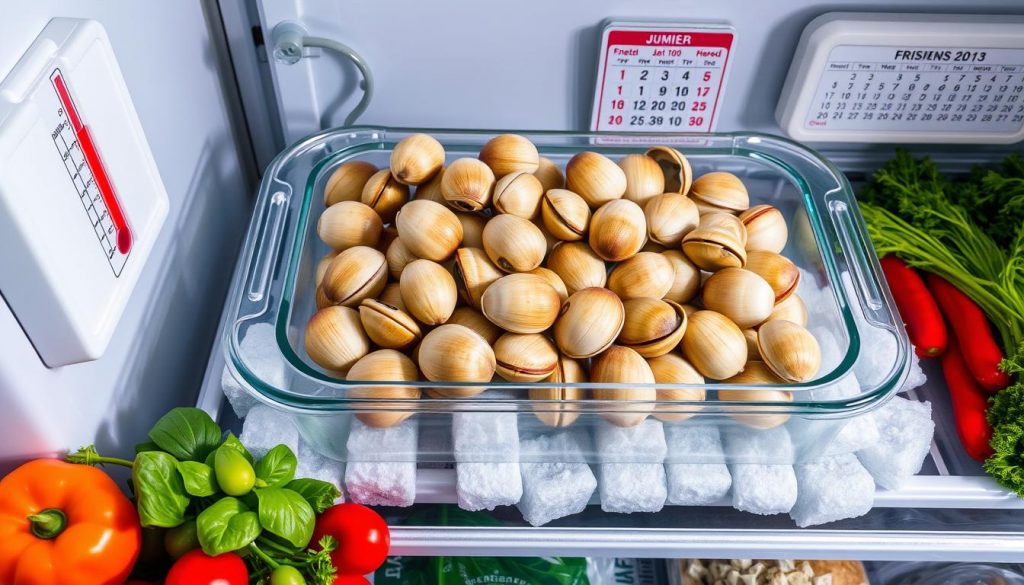
Fresh clams in shells last longest, staying good for 7-10 days when stored right. Shelled and cooked clams keep for 4-5 days in the fridge. Opened canned clams can be refrigerated for 7-10 days.
Keep live clams at 32-35°F (0-2°C) in a container with air flow. This keeps them alive and safe to eat. For best taste, eat live clams within 2-3 days of putting them in the fridge.
| Clam Type | Refrigerator Shelf Life | Freezer Shelf Life |
|---|---|---|
| Fresh Clams in Shells | 7-10 Days | 3 Months |
| Shelled Clams | 4-5 Days | 3 Months |
| Cooked Clams | 4-5 Days | 3 Months |
| Canned Clams (opened) | 7-10 Days | Not Recommended |
Soft-shelled clams don’t last as long as hard-shelled ones. Throw away clams with open or broken shells that don’t close when tapped. Follow these tips to keep your clams fresh and safe to eat.
Proper Storage Techniques for Live Clams
Storing live clams requires care and attention. Let’s look at ways to keep your clams fresh and tasty.
Using Breathable Containers and Mesh Bags
Use breathable containers or mesh bags for live clam storage. These allow air to circulate, keeping clams alive longer. Porous materials like burlap are ideal for this purpose.
If you lack these options, try a bowl with a damp cloth. Place it in the fridge for best results.
Maintaining Proper Moisture Levels
Moisture control is key for clam preservation. Keep clams damp but not underwater. Try placing a wet paper towel over them.
This method mimics their natural habitat. It helps clams stay fresh longer.
Avoiding Common Storage Mistakes
To ensure the best clam preservation, avoid these mistakes:
- Don’t store clams on ice – it can kill them
- Avoid airtight containers or plastic bags – clams need to breathe
- Never submerge clams in water – it can suffocate them
Proper storage keeps clams fresh for up to 48 hours. Store them at around 35°F for best results.
Always check for freshness before cooking. Aim for an internal temperature of 145°F when preparing clam dishes.
Storage Duration for Different Types of Clams
Knowing how long clams last is key to enjoying fresh seafood. This guide will help you make smart choices about storing your clams.
Fresh, unshucked clams stay good in the fridge for up to two days. For best taste, cook them within 24 hours of buying. Eat shucked clams as soon as you can.
Cooked clams last longer. Keep them in a covered container in the fridge. They’ll stay fresh for up to four days.
| Clam Type | Refrigerator Storage | Freezer Storage |
|---|---|---|
| Fresh, unshucked | Up to 2 days | Up to 3 months |
| Shucked | 1 day | Up to 3 months |
| Cooked | 3-4 days | 2-3 months |
Freezing works for long-term storage. Frozen clams can last up to three months at 0°F. These rules apply to most clam types.
Good storage keeps clams fresh and safe. Keep them cold between 32°F and 38°F. This ensures the best flavor and quality.
Signs of Fresh and Spoiled Clams
Fresh clams are essential for a tasty seafood dish. Learn to spot fresh clams using sight, smell, and touch. These tips will help you avoid spoiled seafood.
Visual Indicators of Freshness
Fresh clams have tightly closed shells or snap shut when tapped. This shows they’re alive and fresh. Avoid clams with open shells that don’t close when touched.
Clear clam juice without shell fragments is also a good sign. Look for these visual cues when selecting clams.
Smell and Texture Changes
Fresh clams smell mildly of the ocean. Avoid clams with strong, unpleasant odors, especially those smelling like ammonia. The texture should be firm, not slimy or mushy.
These are important signs of spoilage in seafood. Trust your nose and fingers when checking clams.
Shell Condition Assessment
Examine the shells closely. They should be intact, without cracks or damage. For soft-shell clams and geoducks, gently touch the siphon neck.
It should retract, showing the clam is alive. Try this simple test: put clams in water. Fresh ones sink, while spoiled clams float.
| Freshness Indicator | Good Sign | Bad Sign |
|---|---|---|
| Shell Closure | Closed or closes when tapped | Open and unresponsive |
| Smell | Mild, ocean-like | Strong, ammonia-like |
| Texture | Firm | Slimy or mushy |
| In Water | Sinks | Floats |
Proper storage keeps clams fresh. Use a breathable container in the fridge. Eat them within 1-2 days of purchase for the best flavor and safety.
Temperature Requirements for Clam Storage
Proper temperature is key for keeping clams fresh. Store clams between 32°F and 35°F (0°C to 2°C). This slows bacterial growth and maintains freshness.
Put clams in the coldest part of your fridge. Use a thermometer to check the temperature. Avoid frequent temperature changes as they can affect quality.
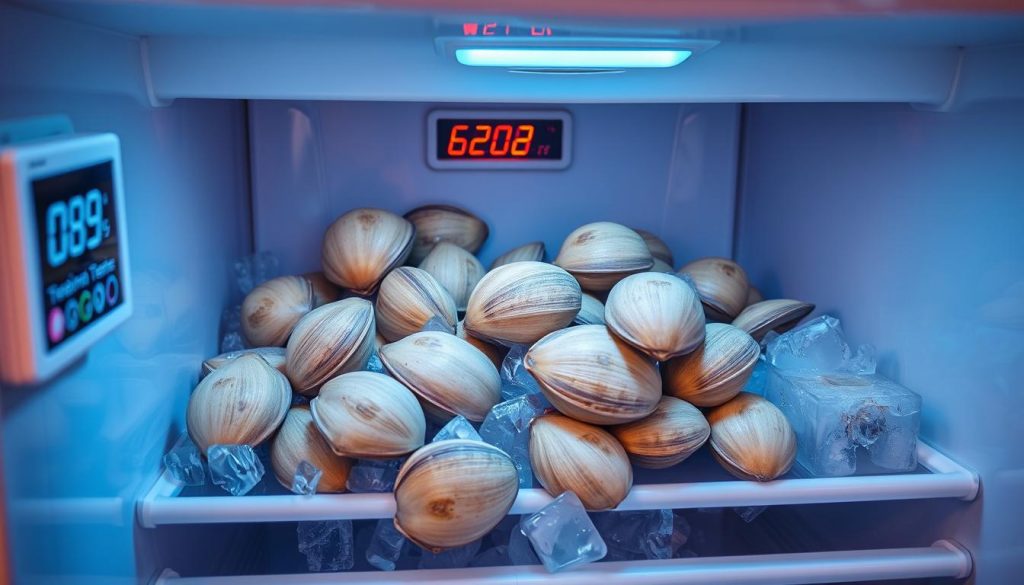
Good storage extends clam shelf life. Fresh clams can last up to a week when refrigerated right. Use them within 2-3 days for best results.
Shucked clams should be eaten within 3 days when kept in the fridge. Always check clams for freshness before eating.
| Clam Type | Refrigerator Storage | Freezer Storage |
|---|---|---|
| Fresh, Live Clams | Up to 7 days | Up to 3 months |
| Shucked Clams | 3 days | 3 months |
| Cooked Clams | 2 days | 2-3 months |
These timeframes assume you’re keeping the right temperature. Always check your clams before eating, no matter how long they’ve been stored.
Storing Cooked Clams vs. Raw Clams
Storing clams correctly keeps them safe and tasty. Let’s look at how to store cooked and raw clams. We’ll also cover some useful seafood preservation methods.
Cooked Clam Storage Guidelines
Cool cooked clams to room temperature first. Then, put them in an airtight container in the fridge. They’ll last 4-5 days this way.
For longer storage, try freezing. Frozen cooked clams stay good for 3-6 months.
Raw Clam Preservation Methods
Store live clams in a ventilated container or mesh bag in the fridge. They’ll stay fresh for 7-10 days. Shucked raw clams last 4-5 days.
To freeze raw clams, remove them from their shells. Pack them in freezer-safe containers. They’ll keep for 3-6 months.
Refrigeration Best Practices
Keep your fridge between 35-40°F for the best clam storage. Store clams away from smelly foods to avoid odor transfer. Check clams daily and throw out any with open or broken shells.
Good storage is key for safe, tasty clams.
| Storage Method | Cooked Clams | Raw Clams |
|---|---|---|
| Refrigeration | 4-5 days | 7-10 days (in shell) |
| Freezing | 3-6 months | 3-6 months (shucked) |
| Room Temperature | 2 hours maximum | Not recommended |
These tips will help keep your clams fresh and delicious. Remember to be careful with seafood storage. When in doubt, it’s better to be safe than sorry.
Freezing Clams for Extended Storage
Freezing clams is a great way to store them long-term. This method lets you enjoy these tasty mollusks even when they’re out of season. Let’s explore the best ways to freeze clams and preserve seafood.
To freeze clams, first shuck them and save their liquid. Rinse the clams with salt water (1 tablespoon salt per quart water). Place them in a freezer-safe container with their liquid and extra salt water.
Frozen clams can last up to 3 months at 0°F (-18°C). Thaw them in the fridge when ready to use. Never refreeze thawed clams, as it affects quality and safety.
Freezing works well for raw clams but not cooked ones. Cooked clams become tough and rubbery when frozen. This method extends clam shelf life from 2-3 days to several months.

